英语常见的修辞格
英语18种重要修辞手法
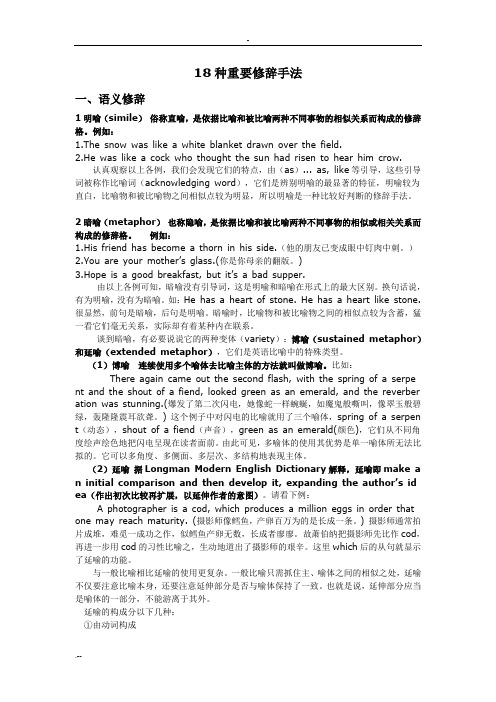
18种重要修辞手法一、语义修辞1明喻(simile)俗称直喻,是依据比喻和被比喻两种不同事物的相似关系而构成的修辞格。
例如:1.The snow was like a white blanket drawn over the field.2.He was like a cock who thought the sun had risen to hear him crow.认真观察以上各例,我们会发现它们的特点,由(as)... as, like等引导,这些引导词被称作比喻词(acknowledging word),它们是辨别明喻的最显著的特征,明喻较为直白,比喻物和被比喻物之间相似点较为明显,所以明喻是一种比较好判断的修辞手法。
2暗喻(metaphor)也称隐喻,是依据比喻和被比喻两种不同事物的相似或相关关系而构成的修辞格。
例如:1.His friend has become a thorn in his side.(他的朋友已变成眼中钉肉中刺。
)2.You are your mother’s glass.(你是你母亲的翻版。
)3.Hope is a good br eakfast, but it’s a bad supper.由以上各例可知,暗喻没有引导词,这是明喻和暗喻在形式上的最大区别。
换句话说,有为明喻,没有为暗喻。
如:He has a heart of stone. He has a heart like stone.很显然,前句是暗喻,后句是明喻。
暗喻时,比喻物和被比喻物之间的相似点较为含蓄,猛一看它们毫无关系,实际却有着某种内在联系。
谈到暗喻,有必要说说它的两种变体(variety):博喻(sustained metaphor)和延喻(extended metaphor),它们是英语比喻中的特殊类型。
(1)博喻连续使用多个喻体去比喻主体的方法就叫做博喻。
比如:There again came out the second flash, with the spring of a serpe nt and the shout of a fiend, looked green as an emerald, and the reverber ation was stunning.(爆发了第二次闪电,她像蛇一样蜿蜒,如魔鬼般嘶叫,像翠玉般碧绿,轰隆隆震耳欲聋。
英语修辞学中20种常见修辞格名称双语释义及举例
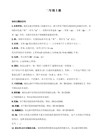
What does that lawyer do after he dies?——Lie still. 那个律师死后干什么?──躺着仍说鬼话。(注:lie躺, 撒谎;still安静地, 仍然)
E. oxymoron; zeugma ; contrast
Oxymoron(矛盾修辞法)与汉语中的反映辞格类似,都是将相互矛盾的概念和判断巧妙地联系在一起,以便相互映衬,突出事物的特点,表达复杂的思想感情和意味深长的哲理。矛盾修辞手法在英语中常见,但在汉语中很少见。如:sweet sorrow 忧喜参半 (不是甜蜜的悲伤); proud humility 不卑不亢(不是骄傲的谦卑)
这个项目从一开始就是一个摆脱不了的经济难题。(Albatross是英国诗人柯勒律治的《古舟子咏》中的信天翁,它被忘恩负义的水手杀死后,全船陷入灾难中。)
B. metonymy; transferred epithet Metonymy、synecdoche和_1antonomasia都是不直接说出事物的本来名称,而换用另一个名称或另一个说法。它们大体上相当于汉语的借代(分为旁借和对代两类)。如Crown(王冠)可喻指君主、王权、王国政府等;doll(玩具)可喻指姑娘、宝贝等。再如:
as thick as thieves亲密无间(不是"像贼一样厚")
as old as the hills古老 (不是"像山一样老")
The ship plows the sea. 船在乘风破浪地前进。(不是"船在犁海")
Allusion与汉语的暗引相近似。其特点是不注明来源和出处,一般多引用人们熟知的关键词或词组,将其融合编织在作者的话语中。引用的东西包括典故、谚语、成语、格言和俗语等。英语引用最多的是源出《圣经》故事以及希腊、罗马神话、《伊索寓言》和那些渊源流长的谚语、格言等。例如:
英语中常见的修辞手法

英语中常见的修辞手法英语中常见的修辞手法1明喻(Simile)simile -简明英汉词典['sɪməli:]n. (使用like或as等词语的)明喻明喻是一种最简单、最常见的修辞方法,是以两种具有共同特征的事物或现象进行对比,表明本体和喻体的关系,两者都在对比中出现,其基本格式是“A像B”,常用的比喻词有as, like, as if, as though等。
如果使用得当可以把深奥的道理说得通俗、浅显、明白,使人可见可感可悟,把简单的事物表达的更为形象更为生动。
例如:Like climbing a mountain, we struggle up three feet and fall back two.(正如爬山,我们费力爬上三英尺,又掉下去两英尺。
)(大学英语第一册第三单元课文B)I see also the dull, drilled, docile, brutish masses of the Hun soldiery blodding on like a swarm of crawling locusts.(丘吉尔在此使用了一个恰当的比喻,把德国士兵比作蝗虫,因为二者有着共同之处-传播毁灭。
)2暗喻(the metaphor)metaphor -简明英汉词典['metəfə]n. 隐喻暗喻也是一种比喻,但不用比喻词,因此被称作缩减了的明喻(a compressed simile)。
它是根据两个事物间的某些共同的特征,用一事物去暗示另一事物的比喻方式。
本体和喻体之间不用比喻词,只是在暗中打比方,从而更生动、更深刻地说明事理,增强语言的表现力。
例如:I will do anything I can to help him through life's dangerous sea.(我将全力帮助他穿越人生的惊涛骇浪。
)(第二册第三单元课文A)Consider that the same cultural soil producing the English language also nourished the great principles of freedom and right of man in the modern world.(想想吧,孕育英语的文化土壤也同样为当今世界培育了自由和人权准则。
英语常见修辞格总结

脏几乎都停止了跳动。
反语Irony['airəni]
反语(irony)是指用含蓄的褒义词语来表示 其反面的意义,从而达到使本义更加幽默, 更加讽刺的效果。(正话反说或是反话正说) 1、It would be a fine thing indeed not knowing what time it was in the morning. 2、Well, of course, I knew that gentlemen like you carry only large notes.
顾名思义,音韵修辞格是利用词语的语音特 点创造出来的修辞手法。 它主要包括 拟声(onomatopoeia)、头韵 (alliteration)这两种修辞格。
拟声 Onomatopoeia [,ɒnəmætə'piːə]
Onomatopoeia 是模仿事物发出的声响的修 辞手法,与汉语的拟声用法完全相同。 1、Presently there came the click of highheeled shoes. 高跟皮鞋声阁阁地传了过来。 2、 On the root of the school house some pigeons were softly cooing. 在学校房屋的屋顶
三、句法修辞格(syntactical rhetorical devices)
句法修辞法主要是指通过句子结构的均衡布 局或是突出重点创造出来的修辞手法。 这类修辞格主要包括 叠言 rhetorical repetition, 反问rhetorical question, 对偶 antithesis等。
明喻 simile和暗喻metaphor
明喻(simile)是以两种 具有相同特征的事物和 现象进行对比,表明本 体和喻体之间的相似关 系。
英语中19种修辞手法的全部解释和例句解析

8.Parallelism 排比, 平行
这种修辞法是把两个或两个以上的结构大 体相同或相似,意思相关,语气一致的短语. 句子排列成串,形成一个整体. 1>.No one can be perfectly free till all are free; no one can be perfectly moral till all are moral; no one can be perfectly happy till all are happy. 所有的人自由後,才能完全自由;所有的 人都有道德,才能完全合乎道德;所有的 人都幸福了,才能真正幸福。
2.Metaphor 隐喻,暗喻
隐喻是简缩了的明喻,是将某一事物 的名称用于另一事物,通过比较形成. 例如: 1>.Hope is a good breakfast, but it is a bad supper. 2>.Some books are to be tasted, others swallowed, and some few to be chewed and digested.
这种修辞是将一系列词语按照意念的大 小.轻重.深浅.高低等逐层渐进,最后达到 顶点.可以增强语势,逐渐加深读者印象. 例如: 1>.I am sorry, I am so sorry, I am so extremely sorry.
19.Anticlimax 渐降法
The duties of a soldier are to protect his country and peel potatoes.
11.Iro误时,用赞同过 失的说法,而在表扬时,则近乎责难的说 法. 1>.It would be a fine thing indeed not knowing what time it was in the morning. 早上没有时间观念还真是一件 好事啊(真实含义是应该明确早上的时 间观念)
英语常用修辞格复习

常用修辞格复习(定义并例证各术语) 一、使用语音手段的修辞格1.Alliteration(头韵):2.Assonance(元韵):3.Consonance(辅韵):4.Onomatopoeia(拟声):5.Aposiopesis(跳脱):6.Apostrophe(呼告):7.Pun(双关):二、使用词汇手段的修辞格1.Simile(明喻)2.Metaphor(隐喻)3.Transferred epithet(移就)4.Personification(拟人)5.Oxymoron(矛盾修辞法)6.Allusion(典故)7.Analogy(类比)8.Allegory(讽喻)9.Synecdoche(提喻)10.Euphemism(委婉语)11.Metonymy(借代)12.Parody(仿拟)13.Hyperbole(夸张)14.Irony(反语)15.Pun(双关)16.Antonomasia(换称)17.Synaesthesia(通感)18.Understatement(低调陈述)19.Zeugma(轭式搭配)20.Syllepsis(一笔双叙)21.Anticlimax(突降)22.Climax(层进)三、使用句法手段的修辞格1.Loose sentence(松散句)2.Periodic sentence(圆周句)3.Antithesis(对偶句)4.Parallelism(排比句)5.Repetition(反复)6.Ellipsis(省略)7.Inversion(倒装)8.Rhetorical question(反问句)A General Review on Figures of SpeechIdentify the figure(s) of speech used in the following sentences.1. "Your Heavens, give me that patience, patience I need!" (Shakespeare)2. Finally, brethren, whatever is true, whatever is honorable, whatever is right, whatever is pure, whatever is lovely, whatever is of good repute, if there is any excellence and if anything worthy of praise, let your mind dwell on these things. (The Bible)3. We felt strong, smug, secure.4. Return to her?…No, rather I abjure all roofs, and choose…To be a comrade with the wolf and owl…(Shakespeare)5. "One of my kids wrote four-letter words in his composition," the teacher said.6. When I was a child, I used to speak as a child, think as a child, reason as a child; when I became a man, I didaway with childish things. (The Bible)7. And do whate'er thou wilt, swift-footed time,To the wide world and all her fading sweets;But I forbid thee one most heinous crime. (Shakespeare)8. All are not apostles, are they? All are not prophets, are they? All are not teachers, are they? All are not workers of miracles, are they? (The Bible)9. Now, what advantage do we derive from hearing a man say that he has shaken off the yoke, that he does not believe that there is a God who watches over his actions, that he regards himself as sole judge of his conduct, and that he does not think of accounting for it to anyone but himself? Does he imagine that by saying this he is encouraging us to feel great confidence in him in the future and to expect comfort, advice, and help from him in the difficult situations of life? Do such men imagine that they have greatly rejoiced us by telling us that they think our soul is only a puff of wind or smoke, and still more by telling us so in an arrogant, self-satisfied tone? Is it a thing to be said cheerily? Is it not rather something to be admitted mournfully as though it were the saddest thing in the whole world? (Pascal)10. Good breeding consists in concealing how much we think of ourselves and how little we think of the otherperson. (Mark Twain)11. Shall the potter be considered as equal with the clay, that what is made should say to its maker, "He did not makeme";or what is formed say to him who formed it, "He has no understanding"? (The Bible)12. Greatness, in the works of architecture, may be considered as relating to the bulk and body of the structure.…Not to mention the Tower of Babel, of which an old author says there were the foundations to be seen in his time, which looked like a spacious mountain…(Joseph Addison)13. Now is the time to rise from the dark and desolate valley of segregation to the sunlit path of racial justice. Nowis the time to open the doors of opportunity to all of God's children. Now is the time to lift our nation from the quicksands of radial injustice to the solid rock of brotherhood. (Martin Luthur King)14. You earn your living and you urn your dead.15. Other things may be seized by might, or purchased with money, but knowledge is to be gained only by study,and study to be prosecuted only in retirement.(Samuel Johnson)16. For ours is the age of four "A's":anxiety, apprehension, agonizing, and aspirin. (James Thurber)17. So will these unattractive and mysterious objects lead to a new world economic order, or will the game beplayed according to the usual industrial rules; from each according to his ability, to each according to his investments?18. 0 soul of mine, will you never be good and sincere, all one, all open, visible to the beholder more clearly thaneven your encompassing body of flesh? Will you never taste the sweetness of a loving and affectionate heart?Will you never be filled full and unwanting; craving nothing, yearning for no creature or thing to minister to your pleasures, no prolongation of days to enjoy them, no place or country or pleasant clime or sweet human company? (Marcus Aurelius)19. It is in art as in morals; no character would inspire us with an enthusiastic admiration of his virtue, if that virtueconsisted only in an absence of vice; something more is required; a man must do more than merely his duty to be a hero.(Joshua Reynolds)20. It is no use doing what, you like; you have, got to like what you do. (W Churchill)21. To be, or not to be; that is the question:Whether 'tis nobler in the mind to sufferThe sting and arrows of outrageous fortune:Or to take arms against a sea of troubles,And by opposing end them…(Shakespeare)22. ... Let them recognize that there are only two kinds of person whom we can describe as reasonable; those whoserve God with all their heart because they have found him, and those who seek him with all their heart because, they have not found him. (Pascal)23. O, who can hold a fire in his handBy thinking on the frosty Caucasus?Or cloy the hungry edge of appetiteBy bare imagination of a feast?Or wallow naked in December snowBy thinking on fantastic summer's best? (Shakespeare)24. Let us be ruthless in our criticism, cruel to personal vanities, indifferent to age, rank or experience if these standin our way. Let all theories be subjected to the bright clear light of practice. (Norman Bethune)25. I Came BackI came back to softness and comfort.I came back to Dr. White's.And I wonder why I ever went away.Because only Dr. White's gives me two kinds of comfort. The supper-comfort of their cotton-wool content that makes them so much softer. And the comfort of a safer, more absorbent towel, with a flush-away design, too,for even more convenience.I tried the rest, but I came back.Isn't it time you came back to Dr. White's?Dr. White's Two kinds of comfort. (Women, Apr. 1977)26. What may be done at any time will be done at no time. (Proverb)27. You might as well expect a leopard to change its spots as expect him to give up smoking.28. He intended to take an opportunity this afternoon of speaking to Irene. A word in time saves nine…(John Galsworthy)29. A little boy came up to his mother. "Ma," he said, "I have something to tell you. My teacher kissed me.”"Well, were you a good boy and did you kiss her back?""Of course not!" he denied indignantly, "I kissed her face.”30. I don't have any rich relations who well leave me money when they die. Whatever I get in life, I'll have to earnby the sweat of my brow.31. Magnus. Frankly, I have been accustomed to regard your President as a statesman whose mouth was the mostefficient part of his head. (Bernard Shaw)32. No longer mourn for me when I am deadThen you shall hear the surly sullen bellGive warning to the world that I am fledFrom this vile world, with vilest worms to dwell…(Shakespeare)33. O what can ail thee, knight-at-arms,Alone and palely loitering?The sedge has withered from the lake,And no birds sing.O what can ail thee, knight-at-arms,So haggard and so woe-begone?The squirrel's granary is full,And the harvest's done. (John Keats)34. O, my luve is like a red, red roseThat's newly sprung in June:O, my luve is like the melodieThat's sweetly played in tune. (Robert Bums)35. His behavior was一but I blush to mention that.36. He had passed many anxious hours before he got the phone call from his daughter.37. Music, when soft voices die,vibrates in the memory一odours, when sweet violets sicken,Live within the sense they quicken. (Shelly)38. Child-bearing, hard work, and constant anxiety were beginning to tell on Mrs Athelny; and sometimes her backached in the evening so that she had to sit down and rest herself. (W. S. Maugham) 39. "Now, sir," said my aunt to Mr. Micawber, as she put on her gloves, "we are ready for Mount Vesuvius, oranything else, as soon as you please.”"Madam," returned Mr. Micawber, "I trust you will shortly witness an eruption…”(Charles Dickens)40. Then the fish came alive, with his death in him, and rose high out of the water showing all his great length andwidth and all his power and his beauty. He seemed to hang in the air above the old man in the skiff. Then he fell into the water with a crash that sent spray over the old man and over all of the skiff. (Hemingway )美文欣赏4 (A formal official Letter)Liao Chengzhi' s Letter to Mr. Chiang Ching-KuoDear brother Ching-Kuo,No one ever expected that a strip of water should have become so vast a distance. It is now 36 years since our brief rendezvous in Nanjing. From our childhood friendship to our chats in the Soviet capital, everything in the past is still alive in my memory. But it's unfortunate that we haven't heard from each other for so many years. Recently I was told that you are somewhat indisposed and this has caused me much concern. Men in their seventies are often afflicted with illness. I sincerely hope that you will take good care of yourself.Over the past three years, our party has repeatedly proposed talks with your party to bury the hatchet and work jointly to accomplish the great cause of national reunification. But you have time and again announced that there should be "no contact, no talks and no compromise", which I think is inadvisable. Considering both the public interests and our close friendship which has lasted for generations, I regard it as my duty to offer some advice which I hope you will consider carefully.The peaceful reunification of the motherland would be a great achievement to be recorded in history. Taiwan is bound to return to the embrace of the motherland eventually. An early settlement would be in the interest of all. The compatriots in Taiwan would be able to live in peace and happiness, the people of all nationalities on both sides of the Taiwan straits would no longer have to endure the pains of separation from their kith and kin, and the elders in Taiwan and those who have moved there from the mainland would all be properly placed and provided for. And this would contribute to the stability of Asia and the Pacific region as well as to world peace. You used to spur yourself on with the axiom: "The interests to be considered should be the interests of all; the fame to be sought should be a fame that would last forever.” If the great cause of reunification would be accomplis hed through your work, you will certainly win the esteem of the nation and the praise of all. You would be doing meritorious service to the country and your name would be inscribed in the temple of fame. It is preposterous to regard such a service as “guilt”. After all, putting up in that tight eastern comer is not a long-term solution. This is of course quite clear for a man as intelligent as you. Hesitation, procrastination or leaving the problem to other days would only lead to difficulty and distress and you, my brother, £®would hardly be able to escape the blame. Moreover, peacefulreunification is entirely an internal affair of China. Those outsiders who talk glibly about it have designs on our Taiwan. This is common knowledge. When a decision needs to be made, irresolution is bound to bring trouble. I hope you will consider this carefully.The Kuomintang, founded by Dr. Sun Yat-sen endured countless hardships and finally overthrew the monarchy and established the republic; numerous revolutionaries advanced wave after wave and laid down their lives for the cause. History has recorded this as a glorious contribution. The Kuomintang and the Communist Party twice cooperated and on both occasions they made tremendous contributions to the country and the nation. We know something about the fast cooperation, led by Dr. Sun Yat-sen, though we were still young at that time. The second cooperation proceeded with your father in the chair and, as participants in it, we should know what it was all about. Though the matter was as complicated as could be, an all-round view of the situation would show that cooperation is beneficial to the country and the nation while division is detrimental to them. Since you are presiding over the administration of Taiwan, you have unshirkable responsibility for the realization of cooperation for the third time. It would be easier to talk the matter over when leaders on both sides used to be schoolmates and close friends who know one another well. I find it really hard for me to subscribe to those views which describe cooperation as "surrender", "humiliating", "suffering losses" or "being duped. In reviewing history or looking forward to the future, one should bear in mind the public interest, the interests of the country and the nation, and use this as the supreme criterion, instead of basing oneself on a party's selfish interests. Such talks as "reunifying China with the Three People's Principles" are regarded by all sensible people as unrealistic, deceptive and self-deceiving. People of¡£ generation know the true meaning of the Three People's Principles quite well and there is no need to argue about it. Neither is there any need to dwell on such assertions as Taiwan's "economic prosperity, democracy and easy livelihood", the truth of which the venerable gentlemen in Taiwan know clearly. For the sake of your party, I would think that if you would take up the historical responsibility and resolutely take part in peace talks to accomplish national reunification as required by time and tide, the two parties would be able to co-exist for a long time to come, supervising each other while joining in the glorious effort to revitalize China. Otherwise how the situation existing in that small corner could be maintained for long? This is a question those who are sensible are already turning over in their minds. It involves the survival and development of the Kuomintang and I hope you will think it over again.I recently read one of your writings in which you expressed "fervent hopes that my father's soul would be able to return to the homeland and be reunited with the forefathers". I was overwhelmed with emotion when I read this. The remains of your father are still placed temporarily at Cihu. After reunification, they would be moved back and buried in the native soil---in Fenghua, Nanjing or Lushan---in fulfillment of your filial wishes. You recently said, "filial devotion should be expanded into national devotion, which means love of the nation and dedication to the country". This is an excellent statement. Why don't you apply it to the great cause of national reunification? As far as the country and nation are concerned, this would be an expression of both loyalty and filial piety. Otherwise how could you account for yourself after your passing away? It is hoped that you would think more about it.Dear brother! Your life has been marked by frustration, which should not be attributed to fate. Everything depends on yourself. The good and ill to be judged in the next thousand years hinge on the decision made in a moment. The present international situation is capricious. Throughout Taiwan people of all strata are talking about their future. Time does not stay and brief is the day. A long night is fraught with dreams; time does not wait for us. I hope you, my brother, would be good at making the choice and repair the house before it rains. Vast is the expanse of sky and water. What are you waiting for, staying away from home?The longing for old friends grows with age. If it is convenient to you, I would pack and set out for a visit to Taibei to seek enlightenment from our elders. "For all the disasters the brotherhood has remained; a smile at meeting and enmity is banished.” When I look towards the distant southern sky, my heart is already there. No word is enough to express what I wish to say. It is hoped that you will take good care of yourself. I am waiting impatiently for a reply.Please convey my regards to your mother as well as to Fang-Liang, Wei-Kuo and the children.Best wishes to you,Liao ChengzhiJuly 24, 1982An informal Letter (A student to a teacher)Prof. ChenMar. 26, 1987I have just received your letter of March 21. 1 was happy to hear that you are well and that you are invited to give lectures in Xi'an Foreign Languages Institute during the summer vacation. How nice it will be to see you again!Things here are going smoothly; and I haven't a thing to be unhappy about. I'd like to thank you heartily for your deep concern about me and great confidence in me.For the next three weeks there will be a general checkup on our teaching work and studies. I have already drawn up a plan with the help of other teachers. According to the requirements of the administration of our university, I intend to do the work in this way:a) Organize two demonstration lessons, one for the first grade teachers, the other for the second grade teachers.b) The teachers will attend each other's classes at least once during the period.c) Organize meetings of students of different grades so as to solicit their opinions and suggestions.The plan is based on the consideration that good experience should be popularized and shortcomings overcome as soon as possible.Please let me have your advice and instructions in regard to this plan.I was very glad to know that you are getting on well with your book. I wish it would come out soon, for I'm sure I can get a great deal from it. I hope you and your wife are enjoying yourselves in Beijing.You say your wife will go to the U. S. next month to see your daughter. Who will take care of you during her one-month stay in the U. S? Don't hesitate to ask Huang Yaping, Qi Min and others for help when you need it.Best wishes,Your student,Ding Xiaoya。
英语修辞格

英语修辞格英语修辞格是运用特定的修辞手法和技巧来增强表达效果和语言的艺术感的一种文学表达方式。
常见的英语修辞格有以下几种:1. 比喻(Metaphor):通过将一个词语或短语用于其本来意义以外的其他事物上,来达到描绘或表达的目的。
例如,“他是我的阳光”(He is my sunshine)。
2. 拟人(Personification):赋予非生物或抽象事物以人的特征和行为,以增加形象感。
例如,“大海呼唤着我”(The ocean calls out to me)。
3. 比较(Simile):通过使用"like"或"as"等介词来进行比较。
例如,“他像一颗流星,闪耀着美丽的光芒”。
4. 反复(Repetition):通过反复使用相同的词语或短语,来强调和重申某个观点或思想。
例如,“我要尽力、尽力、再尽力”。
5. 双关(Pun):利用一个单词或短语在不同语境中的多义性,制造出幽默或双重意义。
例如,“时间都去哪儿了?它去吃饭了。
”6. 排比(Parallelism):通过使用相同的结构、格式或语法,来组织句子和表达思想,形成节奏感和增加强度。
例如,“今天我学会了爬行,学会了站立,学会了行走”。
7. 夸张(Hyperbole):通过夸大事物的特征和情况,来制造出夸张、强烈的效果。
例如,“我等了一万年才见到你”。
8. 反问(Rhetorical Question):利用问句的形式来表达观点或意见,不要求回答,但更多是用来强调说话者的说法。
例如,“难道我们不都是人吗?”这些修辞格可以增加语言的表达力、形象感、感染力和艺术感,使文学作品或演讲更具有吸引力和影响力。
英语中有19种修辞手法
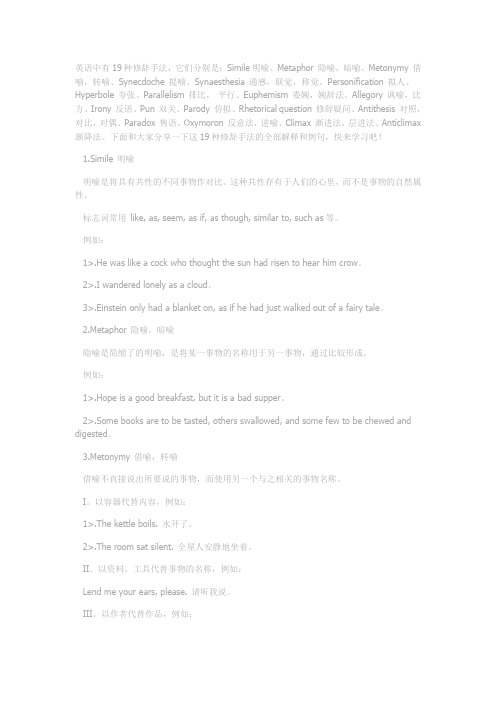
英语中有19种修辞手法,它们分别是:Simile明喻、Metaphor 隐喻,暗喻、Metonymy 借喻,转喻、Synecdoche 提喻、Synaesthesia 通感,联觉,移觉、Personification 拟人、Hyperbole 夸张、Parallelism 排比,平行、Euphemism 委婉,婉辞法、Allegory 讽喻,比方、Irony 反语、Pun 双关、Parody 仿拟、Rhetorical question 修辞疑问、Antithesis 对照,对比,对偶、Paradox 隽语、Oxymoron 反意法,逆喻、Climax 渐进法,层进法、Anticlimax 渐降法。
下面和大家分享一下这19种修辞手法的全部解释和例句,快来学习吧!1.Simile 明喻明喻是将具有共性的不同事物作对比。
这种共性存有于人们的心里,而不是事物的自然属性。
标志词常用like, as, seem, as if, as though, similar to, such as等。
例如:1>.He was like a cock who thought the sun had risen to hear him crow。
2>.I wandered lonely as a cloud。
3>.Einstein only had a blanket on, as if he had just walked out of a fairy tale。
2.Metaphor 隐喻,暗喻隐喻是简缩了的明喻,是将某一事物的名称用于另一事物,通过比较形成。
例如:1>.Hope is a good breakfast, but it is a bad supper。
2>.Some books are to be tasted, others swallowed, and some few to be chewed and digested。
常见英语修辞格

常见英语修辞格常见英语修辞格所谓修辞是指依据题旨情境恰当地选择语言手段和表达方式, 以有效地表情达意。
修辞的目的是使作品更加形象生动、引人入胜。
了解英语中的修辞,有助于我们更好地理解、欣赏文章,也有助于在写作中丰富我们自己的表达。
英语修辞格按其构成大致可以分为三类:1.词义修辞格(Semantic Rhetorical Devices)2.结构修辞格(Syntactical Rhetorical Devices)3.音韵修辞格(Phonetic Rhetorical Devices)(一)词义修辞格(Semantic Rhetorical Devices)词义修辞格主要是指借助语义的联想和语言的变化等特点创造出来的修辞手法。
词义修辞格主要借助语义的联想和语言的变化等特点创造出来的修辞手法。
它们主要包括 :simile, metaphor, analogy, allusion, antonomasia, metonymy, synecdoche,personification, hyperbole, irony, euphemism, pun, oxymoron, paradox, zeugma, transferred epithet, etc.1. Simile 明喻与汉语的明喻基本相同,是以两种具有相同特征的事物和现象进行对比,表明本体和喻体之间的相似关系。
常用来表示明喻的喻词有like, as, as if, as though等。
如:Learning is like rowing upstream; not to advance is to drop back.学如逆水行舟,不进则退。
Bacteria are so small that a single round one of a common type is about 1/25,000 of an inch across when these bacteria aremagnified 1,000 times, they look only as large as a pencil point.细菌是这样小,一种普通类型的圆形细菌直径大约只有1/25,000英寸。
翻译中常见的修辞格
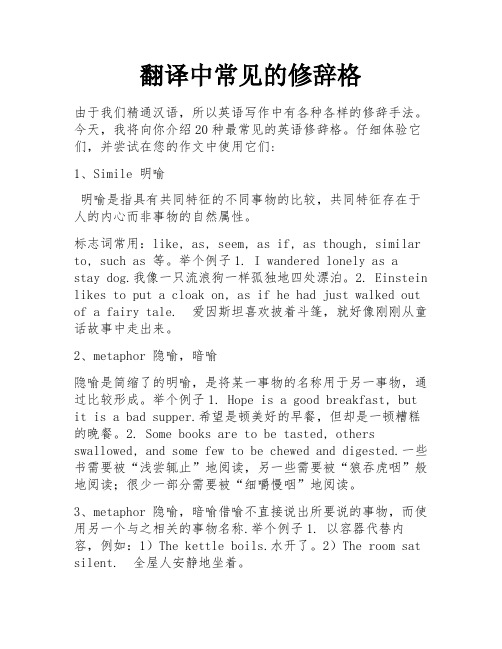
翻译中常见的修辞格由于我们精通汉语,所以英语写作中有各种各样的修辞手法。
今天,我将向你介绍20种最常见的英语修辞格。
仔细体验它们,并尝试在您的作文中使用它们:1、Simile 明喻明喻是指具有共同特征的不同事物的比较,共同特征存在于人的内心而非事物的自然属性。
标志词常用:like, as, seem, as if, as though, similar to, such as 等。
举个例子1. I wandered lonely as astay dog.我像一只流浪狗一样孤独地四处漂泊。
2. Einstein likes to put a cloak on, as if he had just walked out of a fairy tale. 爱因斯坦喜欢披着斗篷,就好像刚刚从童话故事中走出来。
2、metaphor 隐喻,暗喻隐喻是简缩了的明喻,是将某一事物的名称用于另一事物,通过比较形成。
举个例子1. Hope is a good breakfast, but it is a bad supper.希望是顿美好的早餐,但却是一顿糟糕的晚餐。
2. Some books are to be tasted, others swallowed, and some few to be chewed and digested.一些书需要被“浅尝辄止”地阅读,另一些需要被“狼吞虎咽”般地阅读;很少一部分需要被“细嚼慢咽”地阅读。
3、metaphor 隐喻,暗喻借喻不直接说出所要说的事物,而使用另一个与之相关的事物名称.举个例子1. 以容器代替内容,例如:1)The kettle boils.水开了。
2)The room sat silent. 全屋人安静地坐着。
2. 以资料、工具代替事物的名称,例如:Lend me your ears, please. 请听我说。
3. 以代替作品,例如:a plete Shakespeare 莎士比亚全集4. 以具体事物代替抽象概念,例如:I had the muscle, and they made money out of it. 我有力气,他们就用我的力气赚钱。
英文常见的修辞格

英文常见的修辞格常见的修辞格Simile (明喻)Simile is a figure of speech involving a comparison between two or more things whic h are essentially different but have at least one property or characteristic in common.Words like as, as...as, as if, as though,( just) as... so, and like are the commonly us ed expressions to make the comparison.In writing the writer may compare something abstract to something concrete, someth ing remote to something proximal, something unfamiliar to something familiar, and so forth.e.g. That man can’t be trusted. He’s as slippery as an eel.The old man’s hair is as white as snow.Metaphor(暗喻/隐喻)Metaphor involves a comparison between two or more unlike things which share at le ast one property or characteristic, but the comparison is not explicitly stated. Instead, it is implied or condensed.e.g. There were a few lordly poplars(白杨树)before the house.He often prefaced his remarks by “I can’t help thinking…”★the l eg of a tablePersonification (拟人)Personification is a figure of speech that gives human attribute or feelings to animals, or life and personal attributes to inanimate objects, or to ideas and abstractions. It can make the description more vivid and more impressive.e.g. This time fate is smiling to him.Dusk came stealthily.Metonymy (换喻)Metonymy involves the change of name. In other words, this figure of speech involve s the substitution of the name of one thing for that of another. The substituted nam e may be an attribute of the other thing or be closely related with it.e.g. When the war was over, he laid down the sword and took up the pen.His purse would not allow him that luxury.Synecdoche(提喻)Synecdoche, in contrast to metonymy, is a substitution of the part for the whole and the whole for the part.e.g. The farms were short of hands during the harvest season.Germany beat Argentina 2 to 1 in this exciting football match. Euphemism (婉言)Euphemism is a figure of speech which involves the substitution of an agreeable or in offensive expression for one that may offend or suggest something unpleasant. The t opics most likely to be substituted are illnesses, death, old age, toilet habits, poverty and unemployment, menial jobs or professions of low social standing, political and mil itary activities, and so on.e.g. to die——to pass away; to leave usold people——senior citizensmad——emotionally disturbeddustman——sanitation workerLavatory——bathroom; men’s/women’s roomInvasion——military actionHyperbole (夸大、夸张)Hyperbole is a figure of speech which involves a deliberate use of exaggeration to ac hieve emphasis.e.g. She is dying to know what job has been assigned her.On hearing that he had been admitted to that famous university, he whi spered to himself, “I’m the luckiest man in the world.”Understatement (缩小)Understatement is just the opposite of hyperbole. It achieves emphasis by deliberately understating a fact.e.g.It took a few dollars to build this indoor swimming pool.“He is really strange,” his friends said when they heard he had divorced his pretty and loving wife.Transferred epithet (移位修饰)Transferred epithet is a figure of speech where an adjective or descriptive phrase is t ransferred from the noun it should modify to another to which it does not really appl y or belong.e.g.She was so worried about her son that she spent several sleepless nights.The assistant kept a respectful distance form his boss when they were walk ing in the corridor.He said “Yes” to the question in an unthinking mome nt.The old man put a reassuring hand on my shoulder.Oxymoron (矛盾修饰)Oxymoron is a compressed paradox, involving the co-occurrence of two contrasting, c ontradictory or incongruous terms.e.g. She read the long-awaited letter with a tearful smile.When the news of the failure came, all his friends said that it was a vict orious defeat.Alliteration(头韵)A sequence of words beginning with the same sound, especially as used in poetry. e.g. I see also the dull, drilled, docile, brutish masses of the Hun soldiery plodding on like a swarm ofcrawling locusts.The Russian danger is therefore our danger,… just as the cause of any Ru ssian fighting for his hearth and home is the cause of free men and free peoples in every quarter of the globe.Pun (双关)Pun is a figure of speech involving a play on the form and meaning of words. It is u sually amusing and makes your writing more colorful.e.g. One swallow doesn’t make a summer, but it sure warms you on a cold winter d ay.-- What are the differences between men and women?-- Can you conceive?Irony (反讽、反语)Irony is a figure of speech that achieves emphasis or amusing effect by saying the o pposite of what is meant or intended.e.g. a very fat man -- “skinny”a very thin man -- “fat”.“Oh, how I enjoy the freezing weather!” (Actually they hate it. )Paradox (似非而是)Paradox is a figure of speech where a seemingly self-contradictory and absurd statem ent or proposition is used to express something which is true, well-founded or succinc t. This is a twisted expression, so the reader can only arrive at its real meaning upo n further thinking.e.g. The Child is father of the Man.I can resist anything but temptation.Parallelism (平行)Parallelism is a rhetorical device which employs the deliberate arrangement of a succe ssion of parallel construction to achieve emphasis.e.g. We will never parley, we will never negotiate with Hitler or any of his gang. W e shall fight him by land, we shall fight him by sea, we shall fight him in the air, un til, with God’s help, we have rid the earth of his shadow and liberated its people fro m his yoke.Antithesis (对立)Antithesis is a figure of speech where contrasting words or ideas are deliberately arr anged in balanced structural form to achieve emphasis.e.g. Marry in haste, repent in leisure.To err is human, to forgive divine.Rhetorical questions 反问A rhetorical question is a question the answer of which is self-evident and hence seld om demands an explicit answer. This rhetorical device is often used to express the in dignation or astonishment of the speaker / writer or to make argumentation or persu asion more powerful.e.g. But sometimes she would sit by the window and think of the evening long ago. What would have happened if she had never lost those jewels? Who knows?If God be for us, who can be against us?。
英语常用修辞格
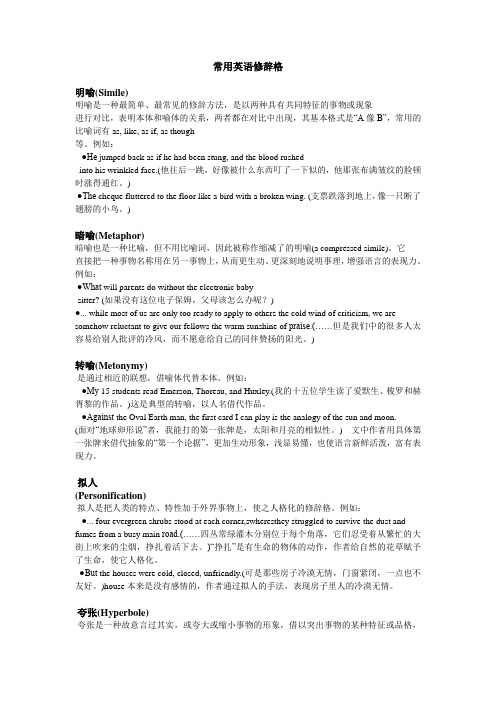
常用英语修辞格明喻(Simile)明喻是一种最简单、最常见的修辞方法,是以两种具有共同特征的事物或现象进行对比,表明本体和喻体的关系,两者都在对比中出现,其基本格式是“A像B”,常用的比喻词有as, like, as if, as though等。
例如:●He jumped back as if he had been stung, and the blood rushedinto his wrinkled face.(他往后一跳,好像被什么东西叮了一下似的,他那张布满皱纹的脸顿时涨得通红。
)●The cheque fluttered to the floor like a bird with a broken wing. (支票跌落到地上,像一只断了翅膀的小鸟。
)暗喻(Metaphor)暗喻也是一种比喻,但不用比喻词,因此被称作缩减了的明喻(a compressed simile)。
它直接把一种事物名称用在另一事物上,从而更生动、更深刻地说明事理,增强语言的表现力。
例如:●What will parents do without the electronic baby-sitter? (如果没有这位电子保姆,父母该怎么办呢?)●... while most of us are only too ready to apply to others the cold wind of criticism, we are somehow reluctant to give our fellows the warm sunshine of praise.(……但是我们中的很多人太容易给别人批评的冷风,而不愿意给自己的同伴赞扬的阳光。
)转喻(Metonymy)是通过相近的联想,借喻体代替本体。
例如:●My 15 students read Emerson, Thoreau, and Huxley.(我的十五位学生读了爱默生、梭罗和赫胥黎的作品。
英语13种修辞手法
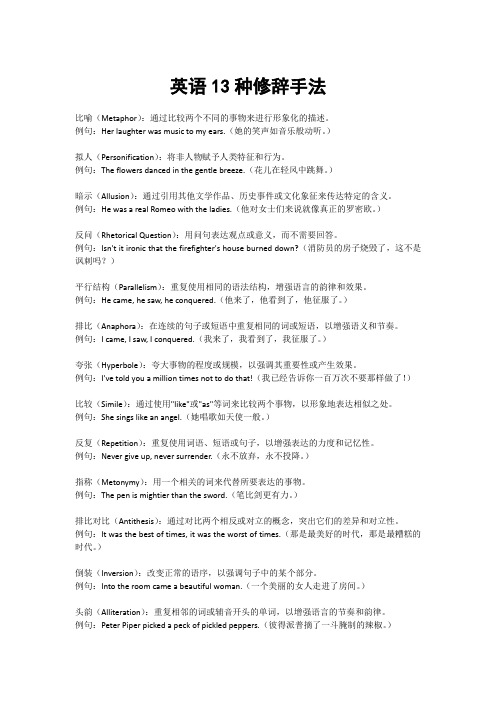
英语13种修辞手法比喻(Metaphor):通过比较两个不同的事物来进行形象化的描述。
例句:Her laughter was music to my ears.(她的笑声如音乐般动听。
)拟人(Personification):将非人物赋予人类特征和行为。
例句:The flowers danced in the gentle breeze.(花儿在轻风中跳舞。
)暗示(Allusion):通过引用其他文学作品、历史事件或文化象征来传达特定的含义。
例句:He was a real Romeo with the ladies.(他对女士们来说就像真正的罗密欧。
)反问(Rhetorical Question):用问句表达观点或意义,而不需要回答。
例句:Isn't it ironic that the firefighter's house burned down?(消防员的房子烧毁了,这不是讽刺吗?)平行结构(Parallelism):重复使用相同的语法结构,增强语言的韵律和效果。
例句:He came, he saw, he conquered.(他来了,他看到了,他征服了。
)排比(Anaphora):在连续的句子或短语中重复相同的词或短语,以增强语义和节奏。
例句:I came, I saw, I conquered.(我来了,我看到了,我征服了。
)夸张(Hyperbole):夸大事物的程度或规模,以强调其重要性或产生效果。
例句:I've told you a million times not to do that!(我已经告诉你一百万次不要那样做了!)比较(Simile):通过使用"like"或"as"等词来比较两个事物,以形象地表达相似之处。
例句:She sings like an angel.(她唱歌如天使一般。
)反复(Repetition):重复使用词语、短语或句子,以增强表达的力度和记忆性。
英语中的修辞手法
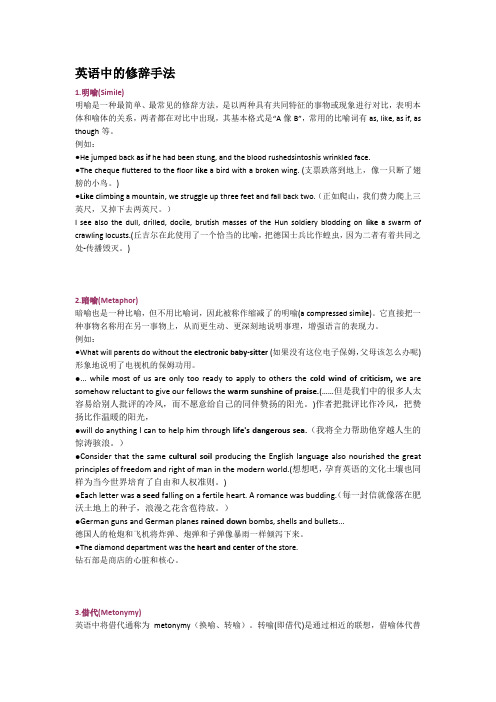
英语中的修辞手法1.明喻(Simile)明喻是一种最简单、最常见的修辞方法,是以两种具有共同特征的事物或现象进行对比,表明本体和喻体的关系,两者都在对比中出现,其基本格式是“A像B”,常用的比喻词有as, like, as if, as though等。
例如:●He jumped back as if he had been stung, and the blood rushedsintoshis wrinkled face.●The cheque fluttered to the floor like a bird with a broken wing. (支票跌落到地上,像一只断了翅膀的小鸟。
)●Like climbing a mountain, we struggle up three feet and fall back two.(正如爬山,我们费力爬上三英尺,又掉下去两英尺。
)I see also the dull, drilled, docile, brutish masses of the Hun soldiery blodding on like a swarm of crawling locusts.(丘吉尔在此使用了一个恰当的比喻,把德国士兵比作蝗虫,因为二者有着共同之处-传播毁灭。
)2.暗喻(Metaphor)暗喻也是一种比喻,但不用比喻词,因此被称作缩减了的明喻(a compressed simile)。
它直接把一种事物名称用在另一事物上,从而更生动、更深刻地说明事理,增强语言的表现力。
例如:●What will parents do without the electronic baby-sitter (如果没有这位电子保姆,父母该怎么办呢)形象地说明了电视机的保姆功用。
●... while most of us are only too ready to apply to others the cold wind of criticism, we are somehow reluctant to give our fellows the warm sunshine of praise.(……但是我们中的很多人太容易给别人批评的冷风,而不愿意给自己的同伴赞扬的阳光。
英文中最常见的20种修辞手法

•
• 2."Of course, you only carry large notes, no small change on you. " The waiter said to the beggar.
• 作者对乞丐说,当然,你只收大钞,所以没零钱啦。
• 12、pun 双关 • 双关就是用一个词在句子中的双重含义、借题发挥、作
the woods. • 我很开心,似乎听到了林中唱歌的鸟儿。
• 7、hyperbole 夸张 • 夸张是以言过其实的说法表达强调的目的。它可以加强语
势,增加表达效果。
• • 举个例子
• 1. I beg a thousand pardons. • 我千百次地祈求宽恕
• 2. Love you. You are the whole world to me, and the moon and the stars.
《My heart leaps up我心雀跃》)
• 17、oxymoron 反意法、逆喻 • • 这也是一种矛盾修辞法,用两种不相调和的特征形容一
个事物,以不协调的搭配使读者领悟句中微妙的含义。 • 往往这样的句子写出来具有很震撼的效果。 • • 例如: • 1. No light, but rather darkness visible. • 没有光,但有看得见的黑暗。 •
•
• 2. If we don't hang together, we shall hang separately.
• 如果我们不团结,就上吊去吧。(注意两个hang意思不 一样)
• 13、parody 仿拟 • 这是一种模仿名言、警句、谚语,改动其中部分词语从
英语中的修辞手法
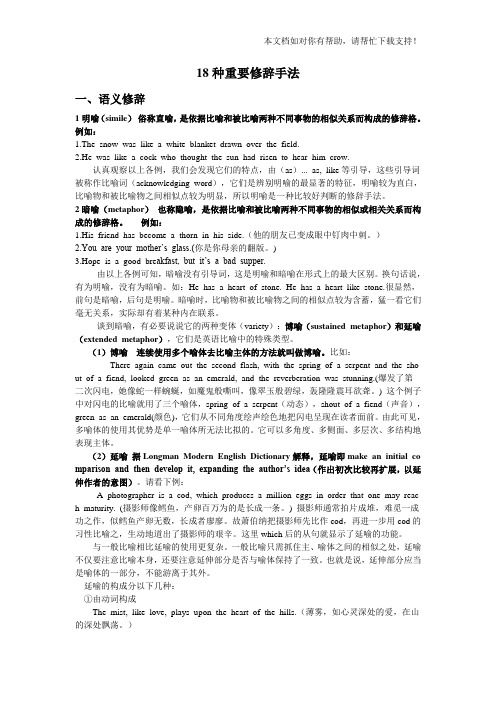
18种重要修辞手法一、语义修辞1明喻(simile)俗称直喻,是依据比喻和被比喻两种不同事物的相似关系而构成的修辞格。
例如:1.The snow was like a white blanket drawn over the field.2.He was like a cock who thought the sun had risen to hear him crow.认真观察以上各例,我们会发现它们的特点,由(as)... as, like等引导,这些引导词被称作比喻词(acknowledging word),它们是辨别明喻的最显著的特征,明喻较为直白,比喻物和被比喻物之间相似点较为明显,所以明喻是一种比较好判断的修辞手法。
2暗喻(metaphor)也称隐喻,是依据比喻和被比喻两种不同事物的相似或相关关系而构成的修辞格。
例如:1.His friend has become a thorn in his side.(他的朋友已变成眼中钉肉中刺。
)2.You are your mother’s glass.(你是你母亲的翻版。
)3.Hope is a good bre akfast, but it’s a bad supper.由以上各例可知,暗喻没有引导词,这是明喻和暗喻在形式上的最大区别。
换句话说,有为明喻,没有为暗喻。
如:He has a heart of stone. He has a heart like stone.很显然,前句是暗喻,后句是明喻。
暗喻时,比喻物和被比喻物之间的相似点较为含蓄,猛一看它们毫无关系,实际却有着某种内在联系。
谈到暗喻,有必要说说它的两种变体(variety):博喻(sustained metaphor)和延喻(extended metaphor),它们是英语比喻中的特殊类型。
(1)博喻连续使用多个喻体去比喻主体的方法就叫做博喻。
比如:There again came out the second flash, with the spring of a serpent and the sho ut of a fiend, looked green as an emerald, and the reverberation was stunning.(爆发了第二次闪电,她像蛇一样蜿蜒,如魔鬼般嘶叫,像翠玉般碧绿,轰隆隆震耳欲聋。
英语常见的修辞格
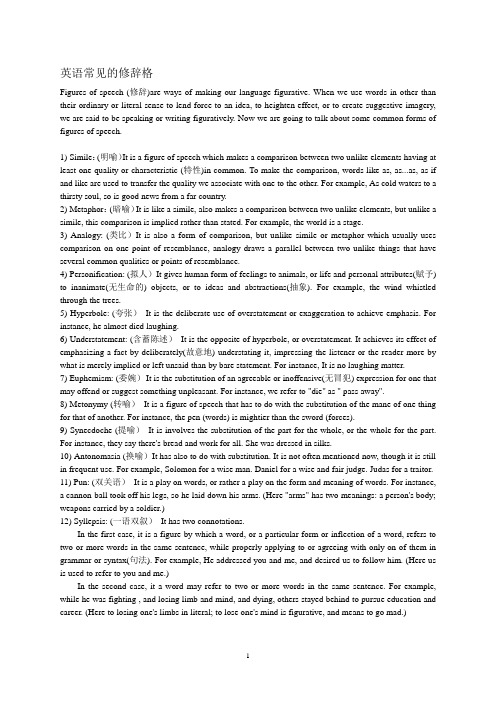
英语常见的修辞格Figures of speech (修辞)are ways of making our language figurative. When we use words in other than their ordinary or literal sense to lend force to an idea, to heighten effect, or to create suggestive imagery, we are said to be speaking or writing figuratively. Now we are going to talk about some common forms of figures of speech.1) Simile:(明喻)It is a figure of speech which makes a comparison between two unlike elements having at least one quality or characteristic (特性)in common. To make the comparison, words like as, as...as, as if and like are used to transfer the quality we associate with one to the other. For example, As cold waters to a thirsty soul, so is good news from a far country.2) Metaphor:(暗喻)It is like a simile, also makes a comparison between two unlike elements, but unlike a simile, this comparison is implied rather than stated. For example, the world is a stage.3) Analogy: (类比)It is also a form of comparison, but unlike simile or metaphor which usually uses comparison on one point of resemblance, analogy draws a parallel between two unlike things that have several common qualities or points of resemblance.4) Personification: (拟人)It gives human form of feelings to animals, or life and personal attributes(赋予) to inanimate(无生命的) objects, or to ideas and abstractions(抽象). For example, the wind whistled through the trees.5) Hyperbole: (夸张)It is the deliberate use of overstatement or exaggeration to achieve emphasis. For instance, he almost died laughing.6) Understatement: (含蓄陈述)It is the opposite of hyperbole, or overstatement. It achieves its effect of emphasizing a fact by deliberately(故意地) understating it, impressing the listener or the reader more by what is merely implied or left unsaid than by bare statement. For instance, It is no laughing matter.7) Euphemism: (委婉)It is the substitution of an agreeable or inoffensive(无冒犯) expression for one that may offend or suggest something unpleasant. For instance, we refer to "die" as " pass away".8) Metonymy (转喻)It is a figure of speech that has to do with the substitution of the mane of one thing for that of another. For instance, the pen (words) is mightier than the sword (forces).9) Synecdoche (提喻)It is involves the substitution of the part for the whole, or the whole for the part. For instance, they say there's bread and work for all. She was dressed in silks.10) Antonomasia (换喻)It has also to do with substitution. It is not often mentioned now, though it is still in frequent use. For example, Solomon for a wise man. Daniel for a wise and fair judge. Judas for a traitor.11) Pun: (双关语)It is a play on words, or rather a play on the form and meaning of words. For instance,a cannon-ball took off his legs, so he laid down his arms. (Here "arms" has two meanings: a person's body; weapons carried by a soldier.)12) Syllepsis: (一语双叙)It has two connotations.In the first case, it is a figure by which a word, or a particular form or inflection of a word, refers to two or more words in the same sentence, while properly applying to or agreeing with only on of them in grammar or syntax(句法). For example, He addressed you and me, and desired us to follow him. (Here us is used to refer to you and me.)In the second case, it a word may refer to two or more words in the same sentence. For example, while he was fighting , and losing limb and mind, and dying, others stayed behind to pursue education and career. (Here to losing one's limbs in literal; to lose one's mind is figurative, and means to go mad.)13) Zeugma: (轭式搭配)It is a single word which is made to modify or to govern two or more words in the same sentence, wither properly applying in sense to only one of them, or applying to them in different senses. For example, The sun shall not burn you by day, nor the moon by night. (Here noon is not strong enough to burn)14) Irony: (反语)It is a figure of speech that achieves emphasis by saying the opposite of what is meant, the intended meaning of the words being the opposite of their usual sense. For instance, we are lucky, what you said makes me feel real good.15) Innuendo: (暗讽)It is a mild form of irony, hinting in a rather roundabout (曲折)way at something disparaging(不一致) or uncomplimentary(不赞美) to the person or subject mentioned. For example, the weatherman said it would be worm. He must take his readings in a bathroom.16) Sarcasm: (讽刺)It Sarcasm is a strong form of irony. It attacks in a taunting and bitter manner, and its aim is to disparage, ridicule and wound the feelings of the subject attacked. For example, laws are like cobwebs, which may catch small flies, but let wasps break through.17) Paradox: (似非而是的隽语)It is a figure of speech consisting of a statement or proposition which on the face of it seems self-contradictory, absurd or contrary to established fact or practice, but which on further thinking and study may prove to be true, well-founded, and even to contain a succinct point. For example more haste, less speed.18) Oxymoron: (矛盾修饰)It is a compressed paradox, formed by the conjoining(结合) of two contrasting, contradictory or incongruous(不协调) terms as in bitter-sweet memories, orderly chaos(混乱) and proud humility(侮辱).19) Antithesis: (对照)It is the deliberate arrangement of contrasting words or ideas in balanced structural forms to achieve emphasis. For example, speech is silver; silence is golden.20) Epigram: (警句)It states a simple truth pithily(有利地) and pungently(强烈地). It is usually terse and arouses interest and surprise by its deep insight into certain aspects of human behavior or feeling. For instance, Few, save the poor, feel for the poor.21) Climax: (渐进)It is derived from the Greek word for "ladder" and implies the progression of thought at a uniform or almost uniform rate of significance or intensity, like the steps of a ladder ascending evenly. For example, I came, I saw, I conquered.22) Anti-climax or bathos: (突降)It is the opposite of Climax. It involves stating one's thoughts in a descending order of significance or intensity, from strong to weak, from weighty to light or frivolous. For instance, But thousands die, without or this or that, die, and endow(赋予) a college, or a cat.23) Apostrophe:(顿呼)In this figure of speech, a thing, place, idea or person (dead or absent) is addressed as if present, listening and understanding what is being said. For instance, England! awake! awake! awake!24) Transferred Epithet: (转类形容词)It is a figure of speech where an epithet (an adjective or descriptive phrase) is transferred from the noun it should rightly modify(修饰) to another to which it does not really apply or belong. For instance, I spent sleepless nights on my project.25) Alliteration: (头韵)It has to do with the sound rather than the sense of words for effect. It is a device that repeats the same sound at frequent intervals(间隔) and since the sound repeated is usually the initial consonant sound, it is also called "front rhyme". For instance, the fair breeze blew, the white foam flew, the furrow followed free.26) Onomatopoeia: (拟声)It is a device that uses words which imitate the sounds made by an object (animate or inanimate), or which are associated with or suggestive(提示的) of some action or movement. 英语修辞大全,英语作文常用修辞手法1. 比喻(metaphor)比喻就是打比方。
英语30种修辞手法
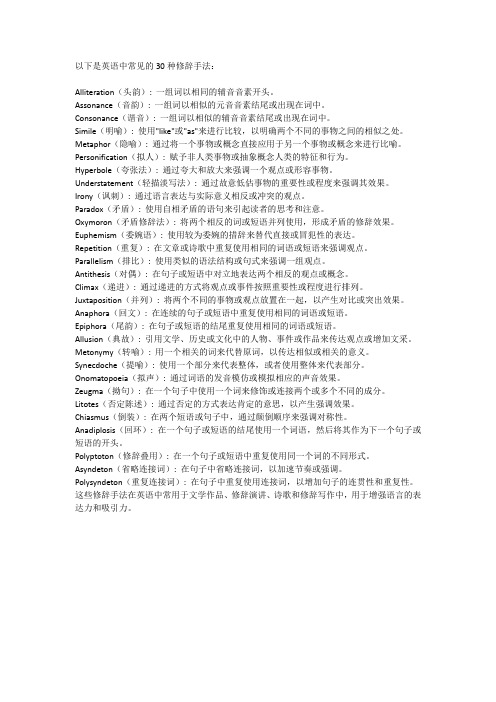
以下是英语中常见的30种修辞手法:Alliteration(头韵): 一组词以相同的辅音音素开头。
Assonance(音韵): 一组词以相似的元音音素结尾或出现在词中。
Consonance(谐音): 一组词以相似的辅音音素结尾或出现在词中。
Simile(明喻): 使用"like"或"as"来进行比较,以明确两个不同的事物之间的相似之处。
Metaphor(隐喻): 通过将一个事物或概念直接应用于另一个事物或概念来进行比喻。
Personification(拟人): 赋予非人类事物或抽象概念人类的特征和行为。
Hyperbole(夸张法): 通过夸大和放大来强调一个观点或形容事物。
Understatement(轻描淡写法): 通过故意低估事物的重要性或程度来强调其效果。
Irony(讽刺): 通过语言表达与实际意义相反或冲突的观点。
Paradox(矛盾): 使用自相矛盾的语句来引起读者的思考和注意。
Oxymoron(矛盾修辞法): 将两个相反的词或短语并列使用,形成矛盾的修辞效果。
Euphemism(委婉语): 使用较为委婉的措辞来替代直接或冒犯性的表达。
Repetition(重复): 在文章或诗歌中重复使用相同的词语或短语来强调观点。
Parallelism(排比): 使用类似的语法结构或句式来强调一组观点。
Antithesis(对偶): 在句子或短语中对立地表达两个相反的观点或概念。
Climax(递进): 通过递进的方式将观点或事件按照重要性或程度进行排列。
Juxtaposition(并列): 将两个不同的事物或观点放置在一起,以产生对比或突出效果。
Anaphora(回文): 在连续的句子或短语中重复使用相同的词语或短语。
Epiphora(尾韵): 在句子或短语的结尾重复使用相同的词语或短语。
Allusion(典故): 引用文学、历史或文化中的人物、事件或作品来传达观点或增加文采。
英语常见的修辞格

英语常见的修辞格英语常见的修辞格Figures of speech (修辞)are ways of making our language figurative. When we use words in other than their ordinary or literal sense to lend force to an idea, to heighten effect, or to create suggestive imagery, we are said to be speaking or writing figuratively. Now we are going to talk about some common forms of figures of speech.1) Simile:(明喻)It is a figure of speech which makes a comparison between two unlike elements having at least one quality or characteristic (特性)in common. To make the comparison, words like as, as...as, as if and like are used to transfer the quality we associate with one to the other. For example, As cold waters to a thirsty soul, so is good news from a far country.2) Metaphor:(暗喻)It is like a simile, also makes a comparison between two unlike elements, but unlike a simile, this comparison is implied rather than stated. For example, the world is a stage.3) Analogy: (类比)It is also a form of comparison, but unlike simile or metaphor which usually uses comparison on one point of resemblance, analogy draws a parallel between two unlike things that have several common qualities or points of resemblance.4) Personification: (拟人)It gives human form of feelings to animals, or life and personal attributes(赋予) to inanimate(无生命的) objects, or to ideas and abstractions(抽象). For example, the wind whistled through the trees.5) Hyperbole: (夸张)It is the deliberate use ofoverstatement or exaggeration to achieve emphasis. For instance, he almost died laughing.6) Understatement: (含蓄陈述)It is the opposite of hyperbole, or overstatement. It achieves its effect of emphasizing a fact by deliberately(故意地) understating it, impressing the listener or the reader more by what is merely implied or left unsaid than by bare statement. For instance, It is no laughing matter.7) Euphemism: (委婉) It is the substitution of an agreeable or inoffensive(无冒犯) expression for one that may offend or suggest something unpleasant. For instance, we refer to "die" as " pass away".8) Metonymy (转喻) It is a figure of speech that has to do with the substitution of the mane of one thing for that of another. For instance, the pen (words) is mightier than the sword (forces).9) Synecdoche (提喻) It is involves the substitution of the part for the whole, or the whole for the part. For instance, they say there's bread and work for all. She was dressed in silks.10) Antonomasia (换喻)It has also to do with substitution. It is not often mentioned now, though it is still in frequent use. For example, Solomon for a wise man. Daniel for a wise and fair judge. Judas for a traitor.11) Pun: (双关语) It is a play on words, or rather a play on the form and meaning of words. For instance, a cannon-ball took off his legs, so he laid down his arms. (Here "arms" has two meanings: a person's body; weapons carried by a soldier.)12) Syllepsis: (一语双叙) It has two connotations.In the first case, it is a figure by which a word, or a particular form or inflection of a word, refers to two or more words in the same sentence, while properly applying to or agreeing with onlyon of them in grammar or syntax(句法). For example, He addressed you and me, and desired us to follow him. (Here us is used to refer to you and me.)In the second case, it a word may refer to two or more words in the same sentence. For example, while he was fighting , and losing limb and mind, and dying, others stayed behind to pursue education and career. (Here to losing one's limbs in literal; to lose one's mind is figurative, and means to go mad.)13) Zeugma: (轭式搭配) It is a single word which is made to modify or to govern two or more words in the same sentence, wither properly applying in sense to only one of them, or applying to them in different senses. For example, The sun shall not burn you by day, nor the moon by night. (Here noon is not strong enough to burn)14) Irony: (反语)It is a figure of speech that achieves emphasis by saying the opposite of what is meant, the intended meaning of the words being the opposite of their usual sense. For instance, we are lucky, what you said makes me feel real good.15) Innuendo: (暗讽) It is a mild form of irony, hinting in a rather roundabout (曲折)way at something disparaging(不一致) or uncomplimentary(不赞美) to the person or subject mentioned. For example, the weatherman said it would be worm. He must take his readings in a bathroom.16) Sarcasm: (讽刺) It Sarcasm is a strong form of irony. It attacks in a taunting and bitter manner, and its aim is to disparage, ridicule and wound the feelings of the subject attacked. For example, laws are like cobwebs, which may catch small flies, but let wasps break through.17) Paradox: (似非而是的隽语)It is a figure of speech consisting of a statement or proposition which on the face of itseems self-contradictory, absurd or contrary to established fact or practice, but which on further thinking and study may prove to be true, well-founded, and even to contain a succinct point. For example more haste, less speed.18) Oxymoron: (矛盾修饰)It is a compressed paradox, formed by the conjoining(结合) of two contrasting, contradictory or incongruous(不协调) terms as in bitter-sweet memories, orderly chaos(混乱) and proud humility(侮辱).19) Antithesis: (对照)It is the deliberate arrangement of contrasting words or ideas in balanced structural forms to achieve emphasis. For example, speech is silver; silence is golden.20) Epigram: (警句)It states a simple truth pithily(有利地) and pungently(强烈地). It is usually terse and arouses interest and surprise by its deep insight into certain aspects of human behavior or feeling. For instance, Few, save the poor, feel for the poor.21) Climax: (渐进)It is derived from the Greek word for "ladder" and implies the progression of thought at a uniform or almost uniform rate of significance or intensity, like the steps of a ladder ascending evenly. For example, I came, I saw, I conquered.22) Anti-climax or bathos: (突降)It is the opposite of Climax. It involves stating one's thoughts in a descending order of significance or intensity, from strong to weak, from weighty to light or frivolous. For instance, But thousands die, without or this or that, die, and endow(赋予) a college, or a cat.23) Apostrophe:(顿呼)In this figure of speech, a thing, place, idea or person (dead or absent) is addressed as if present, listening and understanding what is being said. For instance, England! awake! awake! awake!24) Transferred Epithet: (转类形容词) It is a figure of speech where an epithet (an adjective or deive phrase) is transferred from the noun it should rightly modify(修饰) to another to which it does not really apply or belong. For instance, I spent sleepless nights on my project.25) Alliteration: (头韵)It has to do with the sound rather than the sense of words for effect. It is a device that repeats the same sound at frequent intervals(间隔) and since the sound repeated is usually the initial consonant sound, it is also called "front rhyme". For instance, the fair breeze blew, the white foam flew, the furrow followed free.26) Onomatopoeia: (拟声)It is a device that uses words which imitate the sounds made by an object (animate or inanimate), or which are associated with or suggestive(提示的) of some action or movement.Selected from Figures of Speech by Feng Cuihua。
- 1、下载文档前请自行甄别文档内容的完整性,平台不提供额外的编辑、内容补充、找答案等附加服务。
- 2、"仅部分预览"的文档,不可在线预览部分如存在完整性等问题,可反馈申请退款(可完整预览的文档不适用该条件!)。
- 3、如文档侵犯您的权益,请联系客服反馈,我们会尽快为您处理(人工客服工作时间:9:00-18:30)。
英语知识 > 英语常见修辞格Figures of speech (修辞)are ways of making our language figurative. When we use words in other than their ordinary or literal sense to lend force to an idea, to heighten effect, or to create suggestive imagery, we are said to be speaking or writing figuratively. Now we are going to talk about some common forms of figures of speech.1) Simile:(明喻)It is a figure of speech which makes a comparison between two unlike elements having at least one quality or characteristic (特性)in common. To make the comparison, words like as, as...as, as if and like are used to transfer the quality we associate with one to the other. For example, As cold waters to a thirsty soul, so is good news from a far country.2) meta phor:(暗喻)It is like a simile, also makes a comparison between two unlike elements, but unlike a simile, this comparison is implied rather than stated. For example, the world is a stage.3) Analogy: (类比)It is also a form of comparison, but unlike simile or meta phor which usually uses comparison on one point of resemblance, analogy draws a parallel between two unlike things that have several common qualities or points of resemblance.4) Personification: (拟人)It gives human form of feelings to animals, or life and personal attributes(赋予) to inanimate(无生命的) objects, or to ideas and abstractions(抽象). For example, the wind whistled through the trees.5) Hyperbole: (夸张) It is the deliberate use of overstatement or exaggeration to achieve emphasis. For instance, he almost died laughing.6) Understatement: (含蓄陈述) It is the opposite of hyperbole, or overstatement. It achieves its effect of emphasizing a fact by deliberately(故意地) understating it, impressing the listener or the reader more by what is merely implied or left unsaid than by bare statement. For instance, It is no laughing matter.7) Euphemism: (委婉) It is the substitution of an agreeable or inoffensive(无冒犯) expression for one that may offend or suggest something unpleasant. For instance, we refer to "die" as " pass away".8) Metonymy (转喻) It is a figure of speech that has to do with the substitution of the mane of one thing for that of another. For instance, the pen (words) is mightier than the sword (forces).9) Synecdoche (提喻) It is involves the substitution of the part for the whole,or the whole for the part. For instance, they say there's bread and work for all. She was dressed in silks.10) Antonomasia (换喻)It has also to do with substitution. It is not often mentioned now, though it is still in frequent use. For example, Solomon for a wise man. Daniel for a wise and fair judge. Judas for a traitor.11) Pun: (双关语) It is a play on words, or rather a play on the form and meaning of words. For instance, a cannon-ball took off his legs, so he laid down his arms. (Here "arms" has two meanings: a person's body; weapons carried by a soldier.)12) Syllepsis: (一语双叙) It has two connotations.In the first case, it is a figure by which a word, or a particular form or inflection of a word, refers to two or more words in the same sentence, while properly applying to or agreeing with only on of them in grammar or syntax(句法). For example, He addressed you and me, and desired us to follow him. (Here us is used to refer to you and me.)In the second case, it a word may refer to two or more words in the same sentence. For example, while he was fighting , and losing limb and mind, and dying, others stayed behind to pursue education and career. (Here to losing one's limbs in literal; to lose one's mind is figurative, and means to go mad.)13) Zeugma: (轭式搭配) It is a single word which is made to modify or to govern two or more words in the same sentence, wither properly applying in sense to only one of them, or applying to them in different senses. For example, The sun shall not burn you by day, nor the moon by night. (Here noon is not strong enough to burn)14) Irony: (反语) It is a figure of speech that achieves emphasis by saying the opposite of what is meant, the intended meaning of the words being the opposite of their usual sense. For instance, we are lucky, what you said makes me feel real good.15) Innuendo: (暗讽) It is a mild form of irony, hinting in a rather roundabout (曲折)way at something disparaging(不一致) or uncomplimentary(不赞美) to the person or subject mentioned. For example, the weatherman said it would be worm. He must take his readings in a bathroom.16) Sarcasm: (讽刺) It Sarcasm is a strong form of irony. It attacks in a taunting and bitter manner, and its aim is to disparage, ridicule and wound the feelings of the subject attacked. For example, laws are like cobwebs, which may catch small flies, but let wasps break through.17) Paradox: (似非而是的隽语) It is a figure of speech consisting of a statementor proposition which on the face of it seems self-contradictory, absurd or contrary to established fact or practice, but which on further thinking and study may prove to be true, well-founded, and even to contain a succinct point. For example more haste, less speed.18) Oxymoron: (矛盾修饰) It is a compressed paradox, formed by the conjoining(结合) of two contrasting, contradictory or incongruous(不协调) terms as inbitter-sweet memories, orderly chaos(混乱) and proud humility(侮辱).19) Antithesis: (对照) It is the deliberate arrangement of contrasting words or ideas in balanced structural forms to achieve emphasis. For example, speech is silver; silence is golden.20) Epigram: (警句) It states a simple truth pithily(有利地) and pungently(强烈地). It is usually terse and arouses interest and surprise by its deep insight into certain aspects of human behavior or feeling. For instance, Few, save the poor, feel for the poor.21) Climax: (渐进) It is derived from the Greek word for "ladder" and implies the progression of thought at a uniform or almost uniform rate of significance or intensity, like the steps of a ladder ascending evenly. For example, I came, I saw, I conquered.22) Anti-climax or bathos: (突降)It is the opposite of Climax. It involves stating one's thoughts in a descending order of significance or intensity, from strong to weak, from weighty to light or frivolous. For instance, But thousands die, without or this or that, die, and endow(赋予) a college, or a cat.23) Apostrophe: (顿呼) In this figure of speech, a thing, place, idea or person (dead or absent) is addressed as if present, listening and understanding what is being said. For instance, England! awake! awake! awake!24) Transferred Epithet: (转类形容词) It is a figure of speech where an epithet (an adjective or de script ive phrase) is transferred from the noun it should rightly modify(修饰) to another to which it does not really apply or belong. For instance, I spent sleepless nights on my project.25) Alliteration: (头韵) It has to do with the sound rather than the sense of words for effect. It is a device that repeats the same sound at frequent intervals(间隔) and since the sound repeated is usually the initial consonant sound, it is also called "front rhyme". For instance, the fair breeze blew, the white foam flew, the furrow followed free.26) Onomatopoeia: (拟声) It is a device that uses words which imitate the soundsmade by an object (animate or inanimate), or which are associated with or suggestive(提示的) of some action or movement.。
